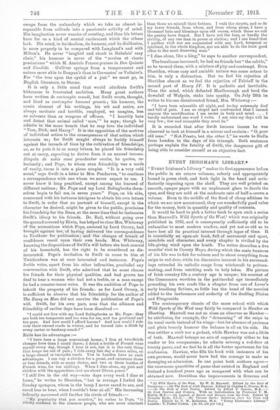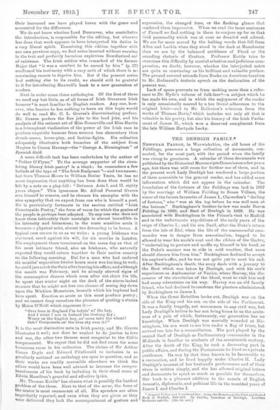EVERY IRISHMAN'S LIBRARY,
"EVERY Irishman's Library" makes its first appearance before the public in six octavo volumes, soberly and appropriately bound in green cloth, and both light in the hand and satis- factorily imposing upon the shelf. They are well printed on smooth, opaque paper with no unpleasant glare to dazzle the eyes, and they are sold at the moderate rate of half-a-crown a volume. Even in the middle of the flood of cheap editions to which we are now accustomed, they are wonderfully good value for the money, both in quantity and quality of contents.
It would be hard to pick a better book to open such a series than Maxwell's Wild Sports of the West,1 which was originally published in 1832, and is consequently sufficiently old to be unfamiliar to most modern readers, and yet not so old as to have lost all its practical interest through lapse of time. It is essentially an open-air book, full of movement and sport, anecdote and character, and every chapter is vivified by the life-giving wind upon the heath, The writer describes a live months' visit to County Mayo, during which the main business of his life was to fish for salmon and to shoot everything from snipe to red-deer, while his discursive interest in his surround- ings extended its catholic range from witchcraft to potteen- making, and from catching seals to holy lakes. His picture of Irish country life a century ago is unique; his account of the Connemara worthies in the patriarchal age immediately preceding his own reads like a chapter from one of Lever's early headlong fictions, so little has the hand of the novelist added to the lawlessness and audacity of the duelling Blakes and Fitzgeralds.
The contemporary classic of the same school with which Wild Sports of the West may fairly be compared is Hawker on Shooting. Maxwell was not so close an observer as Hawker— he attributes, for example, the " drumming" of the snipe to its vocal cords instead of its wings—but for absence of pretence and plain homely humour the balance is all on his side. He was neither a snob nor a pedant, while Hawker was not a little of both. Maxwell betrays no airs of superiority either to his reader or his companions ; he admits missing a red-deer at twenty paces, and we feel he is all the better sportsman for his confession. Hawker, who fills his book with instances of his own prowess, would never have had the courage to make so damaging an admission. In one point both authors agree— the enormous quantities of game that existed in England and Ireland a hundred years ago as compared with what can be obtained now. Doubtless the improvements in firearms and • (1) Wild Sports of the West. By W. H. Maxwell. Edited by the Earl of Dunraven.—(411 The Book of kith Humour. Edited by Charles L. Graves, M.A. —01 The Book of Irish Poetry. Edited by Alfred P. Graves, M.A.-- (4) Irish Orators and Oratory. With an Introduction by Professor T. M. Kettle, Legend: of Saints and Sinners from the Irish. Edited by Douglas Hyde, LL.D.—"(6) Thomas Davis: Solections from his Prose and Be
Poetry. Edited by , T., W. lleston, M.A. " Every Irlshraares Library." Loudon : T. Fisher Unwin. Lee, 65. not per vol.]
their increased use have played havoc with the game and accounted for the difference.
We do not know whether Lord Dunraven, who contributes the introduction, is responsible for the editing, but whoever has done that work appears to have interpreted his duties in a very liberal spirit. Examining this edition together with our own previous copy, we find notes inserted without warning in the text and perfectly harmless expletives Bowdlerized out of existence. The Irish soldier who remarked of his former I►tajor that " it was a oomfort to be cursed by him " (p. 27) confirmed his testimony with a racy oath of which there is no convincing reason to deprive him. But if the present series bad nothing else to its credit, we should still be grateful to it for introducing Maxwell's book to a new generation of readers.
Next in order come three anthologies. Of the first of these we need say but little, as of all forms of Irish literature Irish humour 9 is most familiar to English readers. Any one, how- ever, who fancies he has nothing to learn on this topic would do well to read Mr. 0. L. Graves's discriminating preface. Mr. Graves prefers the fine joke to the loud joke, and his analysis of the reticent art of Miss Somerville and Miss Martin is a triumphant vindication of the power of the high race to produce exquisite humour from sources less elementary than drunkenness, horse-play, and faction-fights. Hie collection adequately illustrates both branches of the subject from Maginn to Canon Hannay—the " Gunge A. Birmingham" of Spanish, Gold.
A more difficult task has been undertaken by the author of "Father O'Flynn." To the average supporter of the circu- lating library Irish poetrys is a blank; he remembers a few ballads of the type of "The Irish Emigrant "—and two names; but from Thomas Moore to William Butler Yeats, he has no more impression that anything has been done than would be left by a note on a : "Between Acts I. and II. eighty years elapse." This ignorance Mr. Alfred Peroeval Graves sets himself to remove, and he chooses his examples with the nice sympathy that we expect from one who is himself a poet. Ife is particularly fortunate in the section entitled "Irish Countryside Poetry," the form of verse for which the genius of the people is perhaps best adapted. To any one who does not know them intimately their nostalgia is almost incredible in its intensity and bitterness; in the more sensitive scads it becomes a physical ache, almost too devouring to be borne. A typical case occurs to us as we write : a young Irishman was stationed, much against his will, for six months in London. 'His employment there terminated on the same day as that of his most intimate friend, also an Irishman, who naturally expected they would return together to their native country on the following morning. But for a man who had endured six months' separation twelve hours more was too long to wait; be could j ust catch the Chain after leaving his office; and al though the month was February, and he already showed signs of the consumptive disease which soon after cut abort his life, he spent that winter night on the deck of the storm-lashed steamer that he might not lose one chance of seeing day dawn upon the Wicklow Mountains, beneath which his boyhood had been spent. Emotion so acute as this must produce poetry; and we cannot deny ourselves the pleasure of quoting a stanza by Moira O'Neill which expresses it
"Over here in England I'm helpin' wi' the hay, And I wisht I was in Ireland the livelong day ;
Weary on the English hay, an' sorra take the wheat!
Och I Corrymeela an' the blue sky over it I "
• It is the most distinctive note in Irish poetry, and Mr. Graves illustrates it well; nor does he neglect to do justice to lore and war, the other two themes most congenial to the Celtic temperament. We regret that he did not find room for some humorous verse in his collection. The claims of Sir Arthur Conan Doyle and Edward FitzGerald to inclusion in so peculiarly national an anthology are open to question, and as their works are readily accessible elsewhere we think the editor would have been well advised to increase the compre- hensiveness of his book by including in their stead some of Edwin Hamilton's graceful and effective lyrics.
Mr, Thomas Kettle4 has chosen what is possibly the hardest Problem of the three. Next to that of the actor, the fame of the orator is most evanescent of all. His speeches are often imperfectly reported, and even when they are given as they Wore delivered they lack the accompaniment, of gesture and expression, the changed tone, or the flashing glance that rendered them impressive. When we read the tame sentences of Purnell we find nothing in them to conjure up for us that livid personality which was at once so dreaded and adored. We are far more moved by the halting words that fell from Allen and Larkin when they stood in the dock at Manchester than we are by the balanced antitheses of Flood or the sounding rhetoric of Grattan. Professor Kettle tries to overcome this difficulty by careful selection and judicious com- pression; we doubt, however, whether the interjected notes are quite BO convincing as his brilliant and valuable preface. The ground covered extends from Burke on American taxation to Mr. Redmond's historic speech on the declaration of the present war.
Lack of space prevents ns from making more than a refer- ence to Dr. Hyde's volume of folk-lore 6—a subject which lie has made his own, and in which the enjoyment of the reader is only occasionally marred by a too literal adherence to the original Iriali—and to Mr. Rolleaton's selection from the works of Thomas Davis,' which includes not only all that is valuable in his poetry, but also his history of the Irish Parlia- ment of James II., which won a deserved compliment from the late William Heirtpole Leoky.







































 Previous page
Previous page